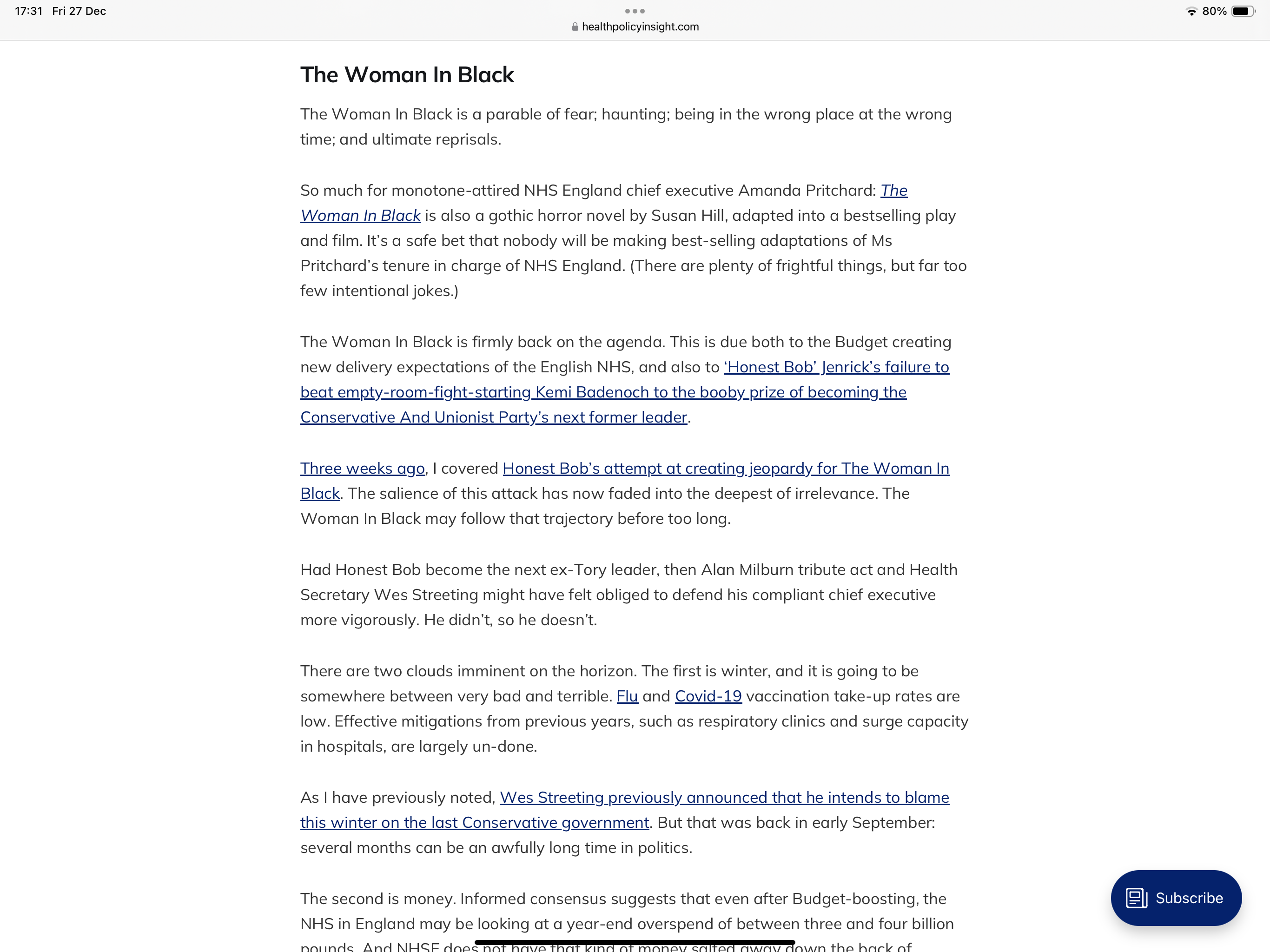Cowper’s Cut 355: Tier and loathing in the English NHS

Well, I suppose that you could claim that 2024 was fun, after a fashion - all depending on your personal level of masochism.
(“Beat me!” begged the masochist; “no”, replied the sadist).
And now it is almost over: good riddance to it (if you’ll excuse the premature congratulation). If I don’t see another year in English health policy like that one, it’ll be fine by me. The US writer Nora Ephron famously announced that “everything is copy”, but sometimes a year is a bit much.
2024 was A Bit Much.
So. Where are we at the end of the year? Apart from in yet another shitty winter.
Politics
Must do better. Much better.
The dismissal of the Conservative And Unionist Party government at the General Election in July (their having co-presided with the Liberal Democrats in coalition, and then post-2015 solely presided over the decade-and-a-half of the most dramatic decline in English NHS performance and public satisfaction in the service’s history) was a source of grim, unsmiling satisfaction. Karma’s a beach. Perhaps their next leader but one after the current placeholder Kemi Badenoch can begin the long and grinding road back towards political sanity: time will tell.
Their replacements, Labour, have laboured with scant success to suggest any sense that they have a direction of travel and a theory of change for the English NHS, both of which are as essential as they are absent. The much-mouthed ‘triple shift’ (from treatment to prevention, from secondary to community and from George to Ringo) is at best an ambition: it is absolutely not a plan or a policy.
The notion that English NHS matters are going so swimmingly that we can wait until May 2025 for the new Ten Year Plan is quaint. But it isn’t sensible. Indeed, it’s leading to decision paralysis: Lord Adebowale‘s recent blog for IPPR was good on this.
Now that they are in office with their knees well under the desk, Labour’s lack of focus on primary care is a staggering oversight. Spending an extra £22 billion on what basically boils down to trying to get back to 18 weeks RTT by the end of this Parliament, while almost stiffing primary care, is a remarkable decision. But not in a good way.
Labour’s lack of a plan for primary care in particular, and for the English NHS in general is general, is vexing. Nor is it new: it was obvious when they were in opposition, as this column often observed. One week, PM Sir Keir Starmer was briefing that the GP contract model was time-expired; another week, Wes Streeting was hymning primary care to the skies.
Putting a decent slug of the additional cash into primary care would have been a no-brainer. It is the risk sink of the NHS: it is the bit of the NHS that by a long way first had properly working IT, and that has always stayed within its budget - facts conveniently forgotten by the Ian Dodges of this world, in their bizarre and quixotic vendetta against independent contractor status.
Social care has been completely forgotten. So few fucks are evidently given about it that the Government should make us all jump with surprise and take a decision about social care: that should be to drop it from the name of the Department For Health But Social Care and from the Secretary Of State’s job title. It isn’t seen as remotely important, so let’s stop pretending.
Performance
Performance in the English NHS is still very bad, in far too many places.
The longstanding yet little-remarked failure of the Care Quality Commission in plain sight; the overlapping and confusing system of safety regulators; the ongoing scandal of many maternity services’ evident unsafety.
Then there are the ambulance handover delays; the A&E 12-hour waits … how long have you got?
Productivity may be starting to improve a bit, very recently, but overall ‘The NHS Productivity Puzzle’ is alive and well.

Tom Calver’s data briefing on NHS VFM in today’s Sunday Times is good on some of the underlying reasons. He notes that “the UK now spends about as much as Canada and France did in 2010. Since then, those countries have added 1.3 and 1.9 years to life expectancy respectively, at a cost of $876 and $580 per person.
“Despite the recent cash injection, the NHS is still run lean — too lean. Take hospital beds. France has 5.8 hospital beds per 1,000 inhabitants, Germany 7.9 and Japan 12.8. The UK has a measly 2.5. Britain also has fewer nurses and doctors than most comparable countries. And the NHS has among the fewest CT and MRI scanners per capita in the developed world.”
There is still no meaningful form of curiosity from national bodies about the root causes of good, bad and indifferent performance.
Which leads us neatly to those in charge …
English NHS national system leadership
Apparently, there is some national system leadership in the English NHS?
I hadn’t noticed.

I’m sometimes told that The Woman In Black, NHS England chief executive Amanda Pritchard, isn’t a bad sort of person. That’s lovely to know.
But she absolutely isn’t a leader, and everybody in the service knows it.
If Mrs Pritchard is chosen as a sacrifice to appease the Angry Gods Of NHS Politicians in 2025, it will be a very slight shame because we will be unable to test the hypothesis that a person could successfully lead NHS England without being skilled in politics and operational grip (see Nicholson D) or super-skilled in politics and relentless in control (see Stevens S).
But it will only be a very slight shame, because Mrs Pritchard has ‘led’ the NHS without any discernible trace of political acumen, operational grip or control, insofar as she has led it at all.
NHS England is an ornamental meeting-cum-talking shop, and a recycling centre for the hard of delivery. If it is meant to be doing system leadership and performance management in the English NHS, then its impact in The Real World shows beyond reasonable doubt that it is an unmitigated failure.
Its radical downsizing to a few hundred genuinely competent people, supported by highly able administrators, cannot come a minute too soon.
Finances
Ha ha ha ha ha ha ha ha ha.
Ha ha ha ha ha ha ha ha ha ha ha ha ha ha ha ha ha ha.
Ha ha ha ha ha ha ha ha ha ha ha ha ha ha ha ha ha ha ha ha ha ha ha ha ha ha ha.
Oh God, this is getting a bit ‘The Shining’.
Still, the money really is royally screwed, no?
The latest NHS England Bored papers from December show us that “the systems assessed as having the highest risk of overspending have been directed to engage external support to ensure that spend controls are operating effectively, their efficiency plans are accelerated and ultimately to reduce their rate of spend to match the available resource …
“Tighter cash-borrowing controls have also been introduced since the start of the year, to help make sure that spending remains in line with plan. Meeting these plans will require systems to deliver cost improvement plans of £9.3 billion (equivalent to 6.9% of their total allocation); and an aggregate reduction in staffing costs by addressing bank and agency spend compared to 2023/24.”
External support: check. Fantasy cost improvement plans: check. Cutting bank and agency spend: check.
Well, I’m reassured. You too, huh? There will definitely be no problem, and I am certain that the last few months will not see any further incentivising of financial lying. What a good thing that the English NHS never does that.
What a mess. It’s not an un-fixable mess, but there is currently no sign of the kind of disciplined thinking that would lead to deliverable planning to fix it.
Ah well. It’s only the way that we get our healthcare. Thank goodness that it’s not as if it were anything that really mattered.
A Chelmsford Carol
Anyway … longstanding readers of Health Policy Insight and ‘Cowper’s Cut’ know of my eagle eye for True Political Greatness.
Long before The People’s Partridge, Matt ‘Alan’ Hancock lit up England’s health politics and policy scene like a camp Catherine wheel, Health Policy Insight was championing The Lion Of Chelmsford, Health Minister Simon Burns.

Chelmsford’s Member of Parliament, The Burns Unit made the health Bill committee that led to the 2012 ‘Lansley’ Act unforgettable, in many and varied ways. His unique marriage of bluster and bathos was a heavenly cocktail.
This is the time of year when we remember absent friends. To that end, I conclude this column with A Christmas Gift For You:
‘The Chelmsford Carol’.
“God rest ye Chelmsford, gentlemen: let nothing you dismay,
For Simon Burns Our Saviour (though fond of Muscadet)
Would save us all from Bevan’s power in Health Bill Committee.
Oh tidings of Chelmsford and joy,
Chelmsford and joy:
Oh tidings of Chelmsford and joy!”
Happy New Year, innit.
Recommended and required reading
If you’re not all Christmas-ed out yet, then Craig Nikolic has a lovely retelling of A Christmas Carol.
Nigel Edwards explains in Health Service Journal that how the NHS changes is just as important as what it changes.
Can AI predict type 2 diabetes 13 years before it starts? The Guardian reports from the start of some London trials.
Can AI predict stroke risk from atrial fibrillation? The Guardian again.
Financial Times piece on the rise of the mental health volunteer movement.
Also FT: biotech takes on personalised cancer therapy side effects.
The hardy perennial of hospital car parking charges gets its annual outing.
Amusing Patrick Maguire column in The Times asks whether Wes Streeting is the Starmer era’s John Moore. The Streeting backlash has gone public.

